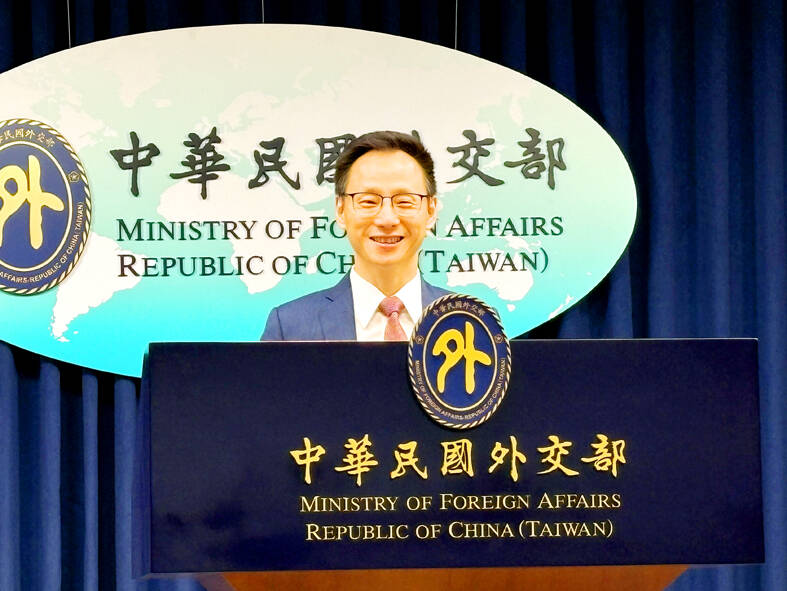Support for Taiwan in the US is a consensus across party lines and administrations, and the US has repeatedly emphasized the importance of Taiwan, showing that peace and stability in the Taiwan Strait is a global consensus, the Ministry of Foreign Affairs said yesterday.
“I know the people very well, respect them greatly. They did take about 100 percent of our chip business. I think Taiwan should pay us for defense,” former US president and presidential candidate Donald Trump said in a Blomberg interview on Tuesday.
Department of North American Affairs Deputy Director Chiao Kuo-you (焦國祐) said the ministry does not comment on the speeches of US presidential candidates, adding that US Department of State spokesman Matthew Miller, US House Committee on Foreign Affairs Chairman Michael McCaul, Congressional Taiwan Caucus cochair Mario Diaz-Balart, and former US national security adviser Robert O’Brien Jr have all made statements emphasizing the importance of Taiwan and US-Taiwan relations.

Photo: CNA
The US has been working with like-minded countries to make peace and stability in the Taiwan Strait not just a US-Taiwan consensus, but also an international one, Chiao said.
He said that Taiwan would work with like-minded countries and step up national defense capabilities to jointly uphold regional peace and stability, he said.
Taiwan People’s Party (TPP) Legislator Lin Yi-chun (林憶君) said that Taiwan’s national defense spending was higher than the average member country of NATO, and its defense capabilities did not lag that far behind most advanced countries.
The US is the greatest benefactor from the current international order, and maintaining such a world order, regardless of who is elected to office, would require the US to work together with its regional allies, which includes Taiwan, Lin said.
Chinese Nationalist Party (KMT) Chairman Eric Chu (朱立倫) said Taiwan has to be self-reliant, adding that it was a mistake to be 100 percent reliant on the US.
O’Brien told Bloomberg that “the Taiwanese have to want their freedom and independence as much as we want it for them.”
“I can’t care more about Taiwan, to send my daughters to defend Taiwan, if the Taiwanese themselves wouldn’t defend Taiwan. And so we need to see the will of the Taiwanese people,” he said, adding, “They need to step up to the plate.”
O’Brien has two daughters who are serving in the US armed forces.
Council on Foreign Relations fellow for Asia studies David Sacks said: “If I was in Taiwan, I would take this statement seriously because it is not an isolated remark — there is now a pattern.”
“This statement, in particular, epitomizes Trumpism because it reflects his purely transactional view of foreign policy,” he added.

Taiwanese can file complaints with the Tourism Administration to report travel agencies if their activities caused termination of a person’s citizenship, Mainland Affairs Council Minister Chiu Chui-cheng (邱垂正) said yesterday, after a podcaster highlighted a case in which a person’s citizenship was canceled for receiving a single-use Chinese passport to enter Russia. The council is aware of incidents in which people who signed up through Chinese travel agencies for tours of Russia were told they could obtain Russian visas and fast-track border clearance, Chiu told reporters on the sidelines of an event in Taipei. However, the travel agencies actually applied

New measures aimed at making Taiwan more attractive to foreign professionals came into effect this month, the National Development Council said yesterday. Among the changes, international students at Taiwanese universities would be able to work in Taiwan without a work permit in the two years after they graduate, explainer materials provided by the council said. In addition, foreign nationals who graduated from one of the world’s top 200 universities within the past five years can also apply for a two-year open work permit. Previously, those graduates would have needed to apply for a work permit using point-based criteria or have a Taiwanese company

The Shilin District Prosecutors’ Office yesterday indicted two Taiwanese and issued a wanted notice for Pete Liu (劉作虎), founder of Shenzhen-based smartphone manufacturer OnePlus Technology Co (萬普拉斯科技), for allegedly contravening the Act Governing Relations Between the People of the Taiwan Area and the Mainland Area (臺灣地區與大陸地區人民關係條例) by poaching 70 engineers in Taiwan. Liu allegedly traveled to Taiwan at the end of 2014 and met with a Taiwanese man surnamed Lin (林) to discuss establishing a mobile software research and development (R&D) team in Taiwan, prosecutors said. Without approval from the government, Lin, following Liu’s instructions, recruited more than 70 software

Chinese spouse and influencer Guan Guan’s (關關) residency permit has been revoked for repeatedly posting pro-China videos that threaten national security, the National Immigration Agency confirmed today. Guan Guan has said many controversial statements in her videos posted to Douyin (抖音), including “the red flag will soon be painted all over Taiwan” and “Taiwan is an inseparable part of China,” and expressing hope for expedited reunification. The agency last year received multiple reports alleging that Guan Guan had advocated for armed reunification. After verifying the reports, the agency last month issued a notice requiring her to appear and explain her actions. Guan